
25 OCTOBER
Venue: FEUP | Grand Auditorium
| 08h30 – 09h00 | Check-in of Participants | |
| 09h00 – 09h10 | Welcome Speech by Dean of FEUP, João Falcão e Cunha | |
| Pillar I: SOCIETY |
Exhibition Coordinated by: |
|
| Moderator: Carlos Oliveira (University of Porto) | ||
| 09h10 – 09h40 | Technopolitics and the Future of the West | Bruno Maçães – Flint Global | |
| 09h40 – 10h10 | Attracting and Retaining Talent | Leonardo Ortega – Enterprise Estonia | |
| 10h10 – 10h40 | Ecosystem Approach to e-Governance | Robert Krimmer – University of Tartu, Skytte Institute | |
| 10h40 – 11h10 | Futures Literacy and Change Studies in Transformative Economy (Era) | Flaviano Celaschi – University of Bologna | |
| Pillar II: CIRCULARITY | ||
| Moderator: Pedro Coelho (University of Porto) | ||
| 11h10 – 11h15 | Sneak peek ‘Future Proof Present’ | by Tocha Films | |
| 11h15 – 11h45 | Human Centric Civilisation | Violeta Bulc – ecocivilisation | |
| 11h45 – 12h15 | Circular Change | Ladeja Godina Košir – Circular Change | |
| 12h15 – 12h45 | Future Proof Present | Beatriz Luz – E4C Brazil | |
| 12h45 – 13h15 | An Electrifying journey with GoWithFlow and Galp | Jane Hoffer – GoWithFlow | |
| 13h15 – 14h15 | Informal lunch @ BIN Lounge | |
| Pillar III: HEALTH AND WELL-BEING | ||
| Moderator: Clara Conçalves (Fraunhofer Portugal) |
||
| 14h15 – 14h45 | Translating Systems Thinking into Public Health Innovations | Terry Huang – CUNY | |
| 14h45 – 15h15 | Mission Cancer: Targeting the Tumor Microenvironment for a Personalized Medicine | Maria José Oliveira – i3S-INEB | |
| 15h15 – 15h45 | Human-centered Design for Living and Ageing with Data | Ana Correia de Barros – Fraunhofer Portugal | |
| 15h45 – 16h15 | Artificial Intelligence in Healthcare | Jonathan Rubin – Philips Research North America | |
| 16h15 – 16h30 | Announcement of the Design Awards by Adico | |
| 16h30 | Bus to Lionesa Business Center | |
|
17h00 – 19h30 |
Visit to Lionesa Business Center
|
|
| 19h30 | Network Dinner @Lionesa Business Center | |
SPEAKERS
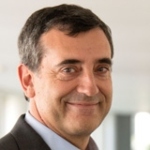 João Falcão e Cunha
João Falcão e Cunha
João Falcão e Cunha is a lecturer and researcher at the Faculty of Engineering (FEUP) of the University of Porto (U.PORTO). He holds a PhD in Computing Science from Imperial College London (1989), a MSc in Operations Research from Cranfield University (1984) and a first degree in Electrical Engineering from the School of Engineering of the University of Porto (1983). He is a member of the ACM and the IEEE – Computer Society. He has been involved with theoretical and experimental work in Software Engineering and Information Systems for the past 20 years. His research interests include decision support systems, graphical user interfaces, object-oriented modelling and service engineering and management. He was the coordinator at FEUP for the integrated master programme in Industrial Engineering and Management, and the master programme in Service Engineering and Management. He was a member of the Executive Committee of ERCIM, the European Research Consortium for Informatics and Mathematics, and the Academic Director of the IBM Center for Advanced Studies in Portugal (IBM CAS Portugal). He is currently the Dean of FEUP.
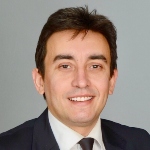 Bruno Maçães
Bruno Maçães
At Flint Global, Bruno advises clients in the tech, life sciences and financial services sectors on EU political issues and policy analysis, Brexit and EU-China relations. He is based in Brussels and Beijing. Before joining Flint, Bruno was Secretary of State of European Affairs in the Portuguese government (2013-2015) and a senior fellow at the Carnegie Endowment for International Peace (Europe) in Brussels. Bruno is currently a non-resident fellow at Renmin University in Beijing and a non-resident senior fellow at the Hudson Institute in Washington, DC. He is the author of several books on international affairs, including The Dawn of Eurasia: On the Trail of the New World Order and Belt and Road: The Sinews of Chinese Power. Bruno is a regular commentator on the international media and has written for the Financial Times, Politico, The Guardian and Foreign Affairs.
JFHJFAFH
 Leonardo Ortega
Leonardo Ortega
Leonardo Ortega works in the Work in Estonia programme at Enterprise Estonia, which aims to attract ICT talents from around the world and support their arrival and adaptation to Estonia. Currently, his main focus is on helping foreigners arriving to Estonia with seminars and group counsellings on a wide arrange of topics that range from professional seminars that help foreigners in their new professional life in Estonia, as well as every day life issues such as how to deal with cultural differences. Leonardo, who has moved from Mexico to Estonia 7 years ago, has helped to further develop talent policy in Estonia with the help of collaboration with different stakeholders and best practices from around the world.
DJFHDJHFD
 Robert Krimmer
Robert Krimmer
Prof. Robert Krimmer holds the ERA-Chair Full Professorship of e-Governance within Skytte Institute, University of Tartu (Estonia). Robert’s research is focused on digital transformation, cross-border e-services, electronic participation and democracy, as well as e-voting, and all issues further developing a digital society. In 2019, he has been mentioned as one of the top 16 academics within the list of 100 most influential people in digital government by Apolitical. Since 2017, Robert has been coordinating TOOP, the EU H2020 large-scale pilot on exploring and demonstrating the feasibility of the once-only principle involving 50+ partners from more than 20 countries inside and outside the EU. Further, he was member of the group of experts to the Council of Europe Ad-Hoc Committee on Electronic Voting (CAHVE) and also one of the lead experts for the Council of Europe Ad-Hoc Committee on Electronic Democracy. Before returning to academia, Robert was OSCE/ODIHR’s first senior adviser on new voting technologies. In the past he advised a number of international organizations, including CoE, OSCE/ODIHR, UNESCO, UNDP, WHO, ITU, IFAD, AfDB, the European Commission or AWEB on matters regarding digital transformation. Teaching duties include lecturing on e-Governance, e-Democracy, e-Participation, e-Voting and End-User Management Information Systems at Tallinn University of Technology, WU Vienna, University of Economics and Business, University of Applied Sciences Hagenberg, and Danube University Krems.
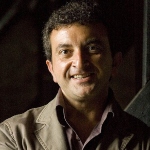
Flaviano Celaschi
PhD in architectural and environmental technologies at Politecnico di Milano (Italy), full professor in industrial design at Università di Bologna, dean of the Design school, president of the Regional Cluster Creative and Cultural Industry, vice president of the Italian cluster MDE IN ITALY. Past full professor in Politecnico di Milano and Politecnico di Torino, he works about advanced design, anticipation, 4.0 Industry and design integration.
FGDGFDGD
FGDGFDGDF
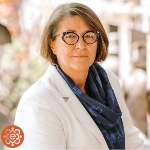 Violeta Bulc
Violeta Bulc
Innovator in mind. Socialist in heart. Environmentalist in spirit. Liberal in actions. Violeta Bulc is a founder and curator of #Ecocivilisation (#EcocivilisationTalks, #EcocivilisationInAction, #YearOfUbuntu, #GlobalOpenHouse) and the G100 Global Chair Member of the Group of 100 Global Women Leaders. The list of various roles and positions that Violeta holds/has held is ample and includes, among others, European Commissioner for Transport (2014 – 2020), Deputy Prime Minister of the Republic of Slovenia (2014), founder and general manager of Vibacom (2000 – 2014). But not only, also the following activities are part of her portfolio: founder and coordinator of InCo movement, president of the Board of Umanotera (Slovenian Foundation for Sustainable Development), vice-president of Telemach (telecommunication provider), director of Telecom Slovenia (carrier business) and member of Advisory Board for Innovation Journalism Stanford University. She has also been the recipient of many national awards for business and social innovation, incl. 3 times best consultancy project of the year in Slovenia.
Ladeja Godina Košir
Ladeja Godina Košir, Founder and Executive Director of Circular Change, is an internationally renowned expert on the circular economy, speaker, (co)author of several CE reports and articles, and co-creator of international circular economy events. Ladeja was the finalist for the Circular Leadership Award 2018 (Davos WEF) and named in “The #EUwomen4future campaign” featuring extraordinary women active in research, innovation, education, culture and sport by Mariya Gabriel, European Commissioner for Innovation, Research, Culture, Education and Youth in 2020. She is recognised as the regional “engine of circular economy transition”. She is co-author of the first Roadmap towards the Circular Economy and creator and team leader of the annual international Circular Change Conference. Ladeja has consulted on the national circular economy roadmapping process based on stakeholder engagement for several countries and cities (Serbia, Montenegro, Norway, Israel, Chile, etc.). Ladeja has several international roles: chair of the coordination group of the European Circular Economy Stakeholder Platform (ECESP) in Brussels (2018/20), visiting professor at Doshisha University in Kyoto and co-leader of the Research Group Circular Economy Systems at the Bertalanfy Center for the Study of Systems Science (BCSSS) in Vienna.
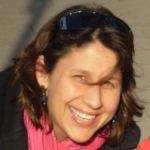 Beatriz Luz
Beatriz Luz
With 10 years of international experience, Beatriz has created a system thinking mindset and the ability to gather people for a common purpose, build networks and facilitate unusual business connections. Back in her home country, Brazil, she has been determined to introduce solutions for the sustainable development of the country. As an entrepreneur she has created the Brazilian Network for Life Cycle Thinking and recently, under her own strategic consultancy, she has created the Brazilian Circular Economy Hub. At present, with Exchange4Change Brasil, Beatriz assists organisations to re-think their business models, re-design products and process and gain competitive advantage through the circular economy mindset and strategies. By applying its own unique global collaborative methodology, she has already worked with specialists from the Netherlands, Portugal and the UK with an aim to co-create and adapt global solutions to the Brazilian reality.
fhjdfhsjfh
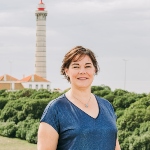
Jane Hoffer
Jane Hoffer is a proven technology leader with experience in startups, growth-stage companies and global enterprises. With her blend of engineering and sales background, she has led sales initiatives at global companies like IBM Corporation and founded, launched and sold technology startups, including Prescient Systems. She brings a strong focus on team-building and empowering employees to embrace responsibility, take risks, and grow in a trusted, open environment. At Flow, her mission is to build on and expand the company’s Sustainable Mobility Management Solutions from its exciting launch in Iberia to a global presence wherever companies are committed to sustainability. Prior to joining Flow in January 2020, Hoffer was Chief Business Officer of Veniam, a Portuguese company based in the United States that provides intelligent networking solutions for connected cars and autonomous vehicles. At Veniam, which won the first Startup Portugal award, Hoffer led the company’s growth and expansion into global markets. Hoffer holds an engineering degree from Texas A&M University. She is based in Portugal.
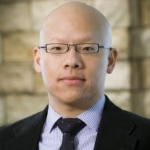 Terry Huang
Terry Huang
Dr. Terry Huang is Professor and Chair of the Department of Health Policy and Management, Director of the Center for Systems and Community Design, and Co-Director of the NYU-CUNY Prevention Research Center (CDC-designated) at the City University of New York Graduate School of Public Health and Health Policy. Previously, Dr. Huang played a leading role at the US National Institutes of Health (NIH) on the integration of systems science and public health. Dr. Huang has had a long history of research and policy leadership in the area of obesity and chronic disease prevention. In addition, he is passionate about systems-oriented community health, design for health, public health entrepreneurship, and strategies for collective impact. Dr. Huang has lectured and published extensively on these and other topics. In addition to his varied academic research endeavors, his current work also focuses on innovations at the intersection of business, design, and health, including the development of a new global public health entrepreneurship platform, Firefly Innovations (www.firefly-innovations.com). Dr. Huang received the US Department of Health and Human Services Secretary’s Innovation Award in 2010 and the NIH Director’s Award in 2011. In addition, he received the National Cancer Institute Award of Merit in 2012 and was named Distinguished Scientist by the University of Nebraska Medical Center in 2013. Dr. Huang holds a PhD in Preventive Medicine and an MPH from the University of Southern California, an MBA from IE Business School (Madrid, Spain), and a BA in Psychology from McGill University (Montreal, Canada). He is Board Certified in Public Health (CPH) and is Fellow, Councilor, and Past Program Chair of The Obesity Society. He is also VP North America and a trustee of the executive board of the World Obesity Federation.
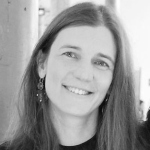
Maria José Oliveira
Maria José Oliveira graduated in Biology by the Faculty of Sciences of the University of Porto and completed her PhD in Health and Medical Sciences at the Faculty of Medicine of Ghent University (Belgium). Her research studies were focused on the role of bacteria on cancer cell invasion, dissecting the associated molecular mechanisms. In 2004, still in the same area of research, she enrolled her PostDoc at IPATIMUP-Institute of Pathology and Molecular Immunology of the University of Porto. Under the scope of Program Ciência 2007, and latter of the 1st Investigator FCT Program, she initiated at INEB-Institute of Biomedical Engineering, a new line of research, focused on the role of the tumor microenvironment on cancer progression and on the design of novel immunomodulatory therapeutic approaches. Maria José Oliveira is since 2017 principal investigator and coordinator of the Tumour and Microenvironment Interactions Group at i3S- Institute for Research and Innovation in Health at the University of Porto. The group has been mainly dedicated to understand how cancer cells modulate the microenvironment, subverting death signals, sustaining proliferation and angiogenesis, and escaping the immune surveillance. Ultimately, translational application, by identifying novel therapeutic targets and designing more efficient immunomodulatory therapies have been exploited. She has been compiling more than 85 manuscripts and book chapters, coordinating distinct research projects, and supervising several PhD and Master students, at the international level. Her work received several awards including the Yamagiwa-Yoshida Memorial Cancer Study Grant, Prizes LabMed, Emmanuel Van der Schueren and L’Óreal/UNESCO/FCT for Women in Science.
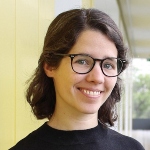 Ana Correia de Barros
Ana Correia de Barros
Ana Correia de Barros is the Head of the Human-Centred Design department at Fraunhofer AICOS, conducting research on assistive products and inclusive design strongly informed by qualitative fieldwork. With a background in industrial design, she holds a PhD in industrial engineering and management from UBI, was a researcher at IADE, led the R&I area at a rehabilitation centre (CRPG) and lectured at different universities.
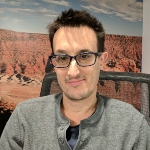 Jonathan Rubin
Jonathan Rubin
Jonathan Rubin is a Senior Scientist at Philips Research North America and a Research Affiliate at MIT’s Computer Science and Artificial Intelligence Laboratory. Jonathan received his PhD in Computer Science from the University of Auckland in 2013. His PhD focused on the use of artificial intelligence in computer games. After his PhD, Jonathan worked as a researcher at Palo Alto Research Center before joining Philips Research in 2016. In his current work, Jonathan develops algorithms using deep learning to automatically analyze medical data, including electronic health records, physiological waveforms and medical images. Jonathan started the IJCAI Workshop on Knowledge Discovery in Healthcare Data, which has been held annually at since 2016. In 2020 Jonathan and his team won first place at the PhysioNet / Computing in Cardiology Challenge.
